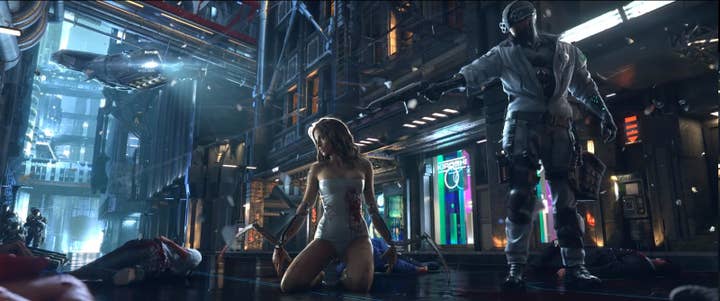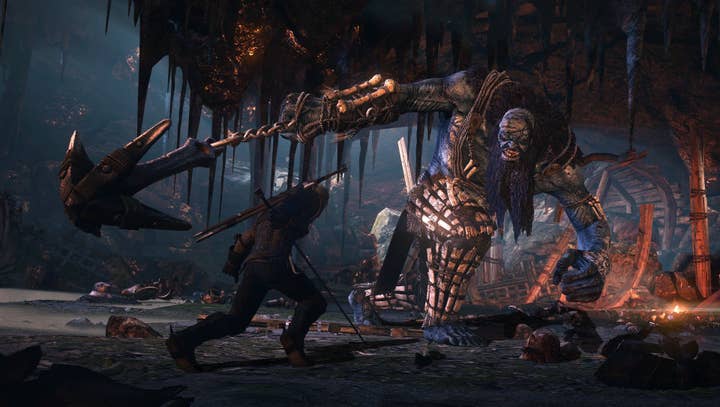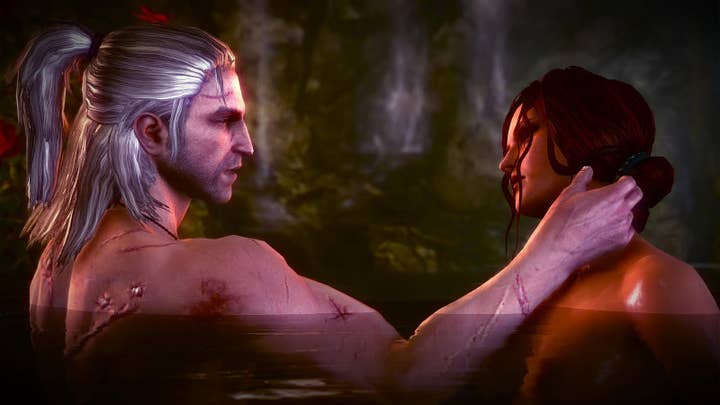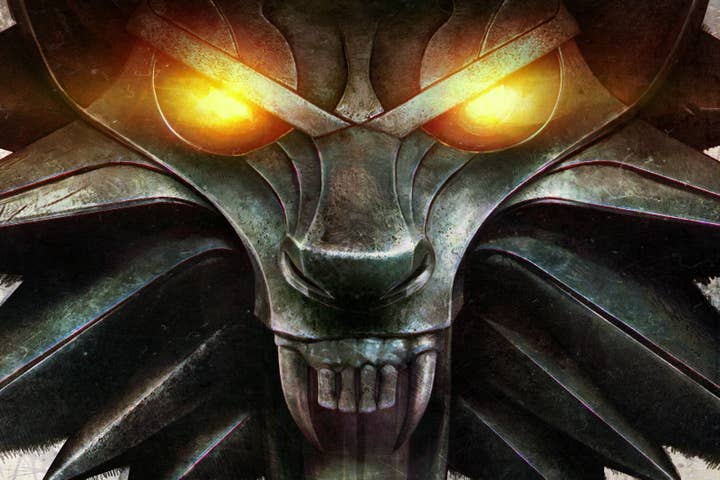CD Projekt RED: "Independence is a crucial part of our strategy"
Studio Head Adam Badowski on GoG, Cyberpunk 2077 and The Witcher 3
Within the first minute of our interview beginning, CD Projekt RED's MD and studio head Adam Badowski speaks a phrase which strikes me on many levels. Firstly, it warms me to him instantly. Secondly, I briefly suspect that he's being tremendously naive. Lastly, I realise that he's the one in charge of a team working on two AAA PC and next gen console titles at once - proof that even if he sounds like an idealist, he's not shy of business smarts either.
"I believe," he tells me, "that if you want to succeed, creative vision has to inform business policy and not the other way around - that's crucial for us."
It's not completely fresh rhetoric. I've heard it from top-level multi-national executives and I've heard it from one-person indie teams, and it's one of those things that can backfire horribly if the person you're talking to doesn't believe you. For what it's worth, Badowski is someone I do believe - and not just because I'm a fan of his team's work.
The evidence is there, of course, in the uncompromising positioning of the Witcher as a series for adults, in its world-weary and cynical anti-hero protagonist Geralt of Rivia, a demon-slaying lady-killer who makes clear that he's working for cash and not cause. It's also there in the central tenets of Good Old Games - the stance against DRM and the support for PC developers. It doesn't hurt that Badowski clearly believes every word himself.
"Sometimes business will decide a company's creative policy, that's very bad for a studio."
Read on for the full chat, covering Witcher 3, Cyberpunk 2077, Good Old Games and the future of publishing.
Growing was hard, but this has always been our studio's policy and our team's policy. We have always aimed for ambitious projects. I believe that if you want to succeed, creative vision has to inform business policy and not the other way around - that's crucial for us. Sometimes business will decide a company's creative policy, that's very bad for a studio.
Financial and business concerns shouldn't decide which path we take or the creative aims of the company. For example right now we are not dealing in the free-to-play market and this is why - the market is far from perfect yet, I think there's something strange and awkward in this business model. So we're not getting involved in it, even if everyone is excited by how much money can be made using this model. Maybe we'll change our minds in that regard, but not yet.
To succeed you have to believe in your project first and then do your job 100 per cent. So the creative side and your heart comes first. Business should be based around your vision.
We believe in great projects and RPG games, that's our vision. That's the right start for every game.

We know a lot about the next gen platforms that we can't comment on yet, but our strategy is that we're always trying to maximise the quality for the platform, to use its particular strengths and advantages. Usually the weakest platform dictates the quality for all platforms, but high-quality visuals are our trademark so we need to approach each platform as individually as possible.
Of course, large scale technical decisions in our engine, such as opting for 64-but architecture, Direct X11, are made globally, but we do try to treat platforms individually. PC allows for more at the moment, but new platforms are stepping up. In the future, it should be much easier to unify the requirements. Some things, like control schemes, will still need to be tailored to the platforms but the new platforms will unify requirements.
PC was the lead platform for Witcher 2 because it was the most powerful, but that might change in the future.
I think the Steambox will be awesome. Because Valve is a digital platform holder, the final contact with the customer will be as easy as possible. That's why we're looking forward to it. We're in contact with Steam, so we're going to be engaged in the process.
GoG is the second biggest independent digital platform after Steam. Of course, the gap is great, but we are second. Origin is bigger too, because it sells games exclusively, but for independent platforms, we're the second biggest. Of course GoG started with older games but has moved to newer games more recently - you can expect that strategy to continue.
GoG is the second biggest independent digital platform after Steam. Of course, the gap is great, but we are second."
Game development is changing - we're starting to see new ideas and ways of financing projects, changes in distribution structure and the influence of digital - that's awesome for us. Retail is costly, it's very static and heavy, inflexible. We think, no we know, it will continue to decline. But that's great for us because digital distribution gives us direct contact with consumers and gamers, let's us control the price and make instant decisions about price drops and special offers.
It's awesome for independent developers to have instant control of their products and the market. Of course, there will be people who will continue to buy boxed product, especially things like collector's editions, but it won't be the industry it was. Having a digital platform is great for us.
I don't know. We haven't had those discussions yet but digital distribution will be the channel in the future.

No, most of the publishers are okay with it. In the beginning it was controversial, but now it's OK. Our DRM strategy has shown that it changes nothing. There's exactly the same number of pirated games whether you have it or not, and DRM is always painful for legal users. It wasn't really a smart decision, it's just reality.
We always wanted to avoid simple good and evil scenarios. The war between good and evil isn't interesting for us. We love controversial stuff, anti-heroes, Sergio Leone's spaghetti westerns, for example. So we have controversial roles and post-modern influences in the storyline.
We have a lot of work ahead of us in that regard because the established plots for Cyberpunk - the wars between corporations, fighting against advanced AI, wars over energy sources, have already all been covered quite thoroughly. There's also the Cyberpunk 2020 game from the '90s. Those scenarios are very familiar. In our opinion, though, nobody has shown Cyberpunk in the way that many people imagined it, we would like to extract those feelings they were getting when watching Ghost in the Shell, Hardware or the motorcycle scenes in Akira.
At the same time we want to refresh this universe which means we have to have a new creative approach to things. We believe that the Witcher taught us that we can handle it.
Working with IP or a series of books is a great start, you have kind of a mirror, you can see different layers of the story at first glance and we're not starting all the details at the beginning. So we have a great start and a basis for the game - it gives us a lot. I think it's a good strategy.
In terms of freedom, we're owners of our IP, so we're free to do almost anything with Cyberpunk and the Witcher. We're creatively independent. It's a good thing to have.
"We don't think that there are enough games for mature, adult players - Cyberpunk is going to be one of them."
We'll be the owners of it. It's always our policy.
We don't think that there are enough games for mature, adult players - Cyberpunk is going to be one of them. We learned a lot from working on the Witcher and we want to go even further on Cyberpunk. There are more main characters, we have different classes and character types, so you can expect some new elements to the storyline. Geralt is described in many books, but for Cyberpunk we need to create the character from the start. We're going to keep the same style as we had in the Witcher in terms of moral decisions, the black and white side of the world, but creating a character from scratch gives us new elements.
What plays a crucial role in Cyperpunk are street stories, which will be more intimate and emotionally engaging for the main characters. I think that epic events are important to these characters, but first we need to focus on the characters themselves and offer choice on epic events.
Sex is a part of almost everybody's everyday life. We're always as mature as we can be - we want controversial scenes in our games, but not in terms of being over the top. They're just a normal element of any interesting story, so we want to treat them in that way, as a part of normal life and stories.

I think some people overreacted - we had long discussions about the roles of the female characters. We have women in our writing team, so we had both sides and directions to the discussion. It's not a part of our marketing strategy. I think the female character in the teaser is a strong character - she's not just a girl. We'll probably show that later on in our next teasers and trailers.
It's really not our strategy to be controversial in this way on this topic.
We are not ready for that sort of development yet. We want to use the whole universe of the Witcher world and do the same with Cyberpunk, but we want to find companies to help us. We want to create comics, board games, stuff like that but I don't think we can handle this on site. If we want to extend our scope we need to find talented companies with better expertise in those particular areas. We're not going to get any bigger than 200 people, we're going to focus on games.
Independence is a crucial part of our strategy. That means we need to be independent in both ways. First, financially and secondly creatively - they're both crucial for us. So as a company we're listed publicly on the Warsaw stock exchange, which gave us financial independence and creatively we own all our IP so we're free to invest in our own business with total creative freedom. This gives us a fresh eye in the studio, so it's very important to us. Maybe we could get extra money or experience, but it wouldn't make us happy.
"Independence is a crucial part of a our strategy."
Also, having our own distribution channel has given us a lot of independence.
I think it's always in our mind. We have loads of ideas, but we wanted to take lessons from well-established IPs to be prepared as a team and a studio. That was a good lesson, because now we know that the devil is in the details. You can't just just create the central character or story when you create a universe, you have to establish the whole universe, know how it works on every level. You need to create a history for your world.
Then you can offer something unique and players will notice that you have something different, something deeper, something unique. You have to create a kind of bible, then you can start thinking about something new. Of course, if you want to develop a small game based on just gameplay it's much easier, but we as a team want to only make great games. We believe in huge stories, maybe we're old fashioned guys, but we don't want to jump on that train with those new business models.









